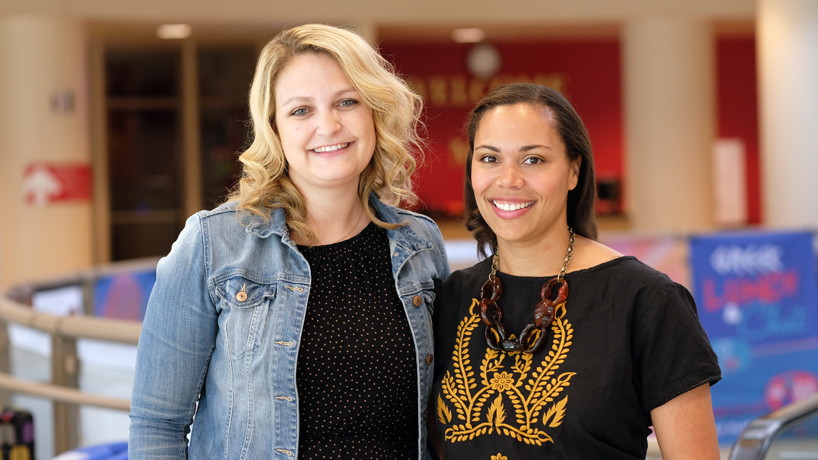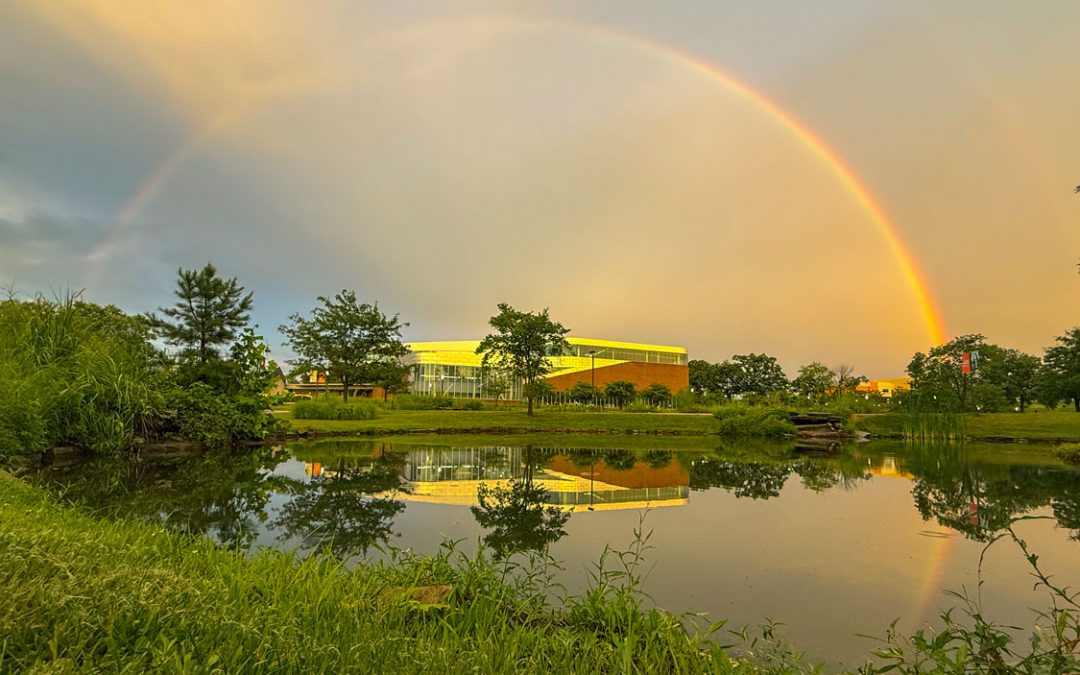
Chelsea Witwer and Julia Wilkins earned the EdD Dissertation of the Year award from the UMSL College of Education. Their co-authored research examined power structures and their effects on the populace. (Photo by August Jennewein)
Julia Wilkins noticed a trend developing with her second-grade students during the civil unrest that followed the Michael Brown shooting in 2014.
Even though she taught at an independent school in an affluent area of St. Louis – miles away from Ferguson and occupying an entirely different socioeconomic space – the students were still bringing the events of the day with them to class.
Chelsea Witwer was noticing the same thing with her elementary students in Kirkwood. She and Wilkins gravitated toward each other shortly after they first met in fall 2016 as part of the same “Creativity and Generative Design in Education” EdD cohort at the University of Missouri–St. Louis.
“We both felt that we didn’t have the luxury, nor did we want the luxury, of sort of sweeping everything under the rug,” Wilkins said. “We both made the decision to, instead of pretending that these conversations aren’t happening at home and kids aren’t hearing things on the news, bring it to the classroom and make an authentic learning experience for both the students and their families.”
Wilkins and Witwer created parallel curricula for their students dealing with the theme of examining power structures and their effects on the populace. Their 340-page, co-authored dissertation – “Fostering Critical and Creative Thinking in the Elementary Social Studies Classroom: Teaching Social Justice Through the Lenses of Power and Oppression and Site-Based Experiences” – earned the EdD Dissertation of the Year award from the UMSL College of Education this spring.
Wilkins and her students have shown some of their classwork in art galleries. Witwer is leading a team that is reworking the social studies curricula for the entire Kirkwood School District using the framework she created and studied in her dissertation. They’ll be teaching a course at UMSL in the fall for the Department of Educator Preparation and Leadership: “Teaching Elementary Social Studies in Inclusive Settings.”
It’s all coming from a shared desire for change.
“We would both argue that social studies curriculum needs to undergo its own revolution,” Wilkins said. “It’s not about teaching isolated events from the powers’ perspective. It’s not about looking at a group that was oppressed in this pitying way. We need to engage in more enriching and difficult conversations with students and really allow them to hone their beliefs and ideas.”
Roots of revolution
Witwer’s initial interest in shaping her own social studies curricula came from listening to parents, colleagues and friends react to the Ferguson unrest.
She was shocked that they were shocked.
“It shouldn’t have been a surprise,” Witwer said. “It was a pattern we’ve seen when there was a group that was trying to say all along that this is not right, that there were some abuses of rights. This was just the pivotal moment where it all shifted.”
Witwer wanted to help put the events in Ferguson in perspective for her students by studying the circumstances that led up to historical revolutionary movements in the United States and Russia. She also wove in the tactics members of disenfranchised groups have used to agitate for rights throughout history, such as the women’s suffrage movement, Nelson Mandela’s work in South Africa and the more recent example of Malala Yousafzai.
While educational resources such as videos and readings supplemented the curriculum, Witwer said most of the value to the students came from projects and dialogue.
At the end of the term, students were presented with the example of the Mexican Revolution and asked to apply what they’d learned throughout the course to determine the conditions that led to it.
“The level of engagement was very high,” Witwer said. “Students wanted to grapple with these topics, so I had to create a classroom community that is safe and comfortable, where students can have courageous conversations. That was pretty paramount to the success of it.”
Beauty is everywhere
As part of Wilkins’ curriculum, she accompanied her second-graders to historic St. Louis neighborhoods, equipped them with cameras and asked them to snap shots of the beauty they found.
Artwork and photography produced by Julia Wilkins’ students were featured in the Sheldon Art Galleries last fall. (Photo courtesy of Julia Wilkins)
A sewer grate in front of a wall of graffiti. Part of a bike rack in University City. A locker in the halls of Sumner High School in The Ville. Innovative viewpoints reflected in photos that don’t seem out of place hanging in the Sheldon Art Galleries, where the works were displayed last fall.
“Their photography is just so raw, none of the things I’d think to take a picture of,” Wilkins said. “You’re looking at a building downtown that you’ve walked past a million times but you’re suddenly, instead of seeing it straight on, you’re seeing it from 3 feet off the ground looking up. It changes your perspective – literally – of the city.”
Wilkins uses the field trips as one way to enforce the broader motif of her curriculum: how generations of de facto and de jure segregation in St. Louis molded the city’s current form.
She said, through the course of her EdD study, she got a little bit of pushback within the cohort about whether such weighty topics were “developmentally appropriate” for young students. Her former advisor, Ralph Cordova, said that term refers more to the educator than the child.
“Really what it means is what you as a teacher are comfortable with,” Wilkins said. “Some of the literature that we looked at talked about how kids do have a concept of fairness at a very young age. It’s not about throwing these heavy topics at them. It’s about scaffolding the learning experience.”
Both Wilkins and Witwer chose the UMSL EdD program because of its emphasis on collaboration and creativity.
Now with their doctorates, they’re equipped to start transforming teachers’ approaches to social studies.
“The buzz term is that we’re creating thinkers of the future: We want our children to go on and be leaders,” Wilkins said. “But those skills that they need are always changing. We both teach at schools with a lot of very privileged students who aren’t necessarily members of marginalized groups.
“It’s one thing to teach them about how others experience the world, but it’s something more to teach them that when you see these patterns that continue to play out, you don’t wait until everything completely erupts. You find ways of integrating and using your privileges to help others.”















